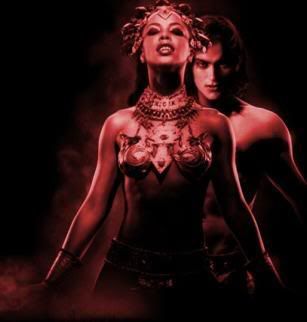Afro-Punk thread: Black Female Antagonists in Cinema
I love the feedback and opportunities for thoughtful interaction that I get through my profile on afropunk.com.
Within this space, I recently re-posted an older blog entry I had written a while ago about Girl Antagonists in Cinema. Matrix commented and asked me to expound on a similar yet slightly broader (and more challenging) category: Black Female Antagonists.
(my original definition)
Defining the Girl Antagonist:
She has no allegiances, rebukes any boxing in of social norms. She manipulates the common stereotypes that come with her identity – The Young Girl: Innocent, Meek, Naive. She does not seek protection and in fact is a destructive force. Regardless of who may be hurt in the process (like the typical male antagonist) she will use any subversive means to achieve her goals.
In most films, the girl antagonist, like the femme fatale, usually “gets what’s coming to her” however there are rare occasions when she suffers no retribution.
___________________________________________________
She didn’t specify age range so I am adhering to my original definition but not limiting it to
characters under 18 years old.
I am purposely avoiding characters from blaxploitation films because that is too easy.
Feel free to comment and leave those if you would like, along with any other black female antagonists I may have missed.
Some Recent Examples of Black Female Antagonists:

(The Craft, 1996)
Rachel True’s character Rochelle is part of a teenage coven of witches who are social outcasts at their Los Angeles catholic high school. Rochelle uses witchcraft to seek vengeance on her bullies and eventually turns on her own friend, Sarah Bailey, when she refuses to participate in their increasingly dangerous games. The karma of her spells catch up on her and eventually she experiences a “hair raising” punishment that, in the end, is a lesson she doesn’t gain any real insight from.

(Queen of the Damned, 2002)
Akasha and her King are the makers of all vampires who, after drinking the ancient world dry, are found slumbering by Lestat in a secret room. Akasha eventually drinks her own King to death and sets her sights on Lestat, wanting to make him her new main squeeze. When Akasha rescues Lestat from a vampire attack, she flies him to an island where she had already killed everyone and makes love to him as a means to share her blood with him. It is not to be however, as ancient vampires seek to overthrow her rule and eventually Lestat chooses a human over her and tries to kill Akasha. In an epic vampire battle, Pandora drinks the last drop of the queen’s vampire blood and Akasha turns to ash.
A lot of people did NOT like this movie but I thought Aaliyah’s performance was provocative and entertaining.

(The Chronicles of Riddick, 2004)
The Necro Dame Vaako (Thandie Newton), is a dame not to be trifled with. She is power hungry, so much so that she is willing to orchestrate a coup on her own leader. She discovers that Lord Marshal, leader of the Necromongers, previously tried to exterminate the race of Furians (Riddick’s heritage) because of a prophecy which foretold he would be killed by one. After a battle, Lord Marshal believes Riddick is dead and as a reward promotes Vaako , Dame Vaako’s partner and political puppet, to first among Commanders. Dame Vaako manipulates Vaako into believing they should allow Riddick to kill Lord Marshal so that Vaako can kill Riddick and then become Lord of the Necromongers. Her plan doesn’t work however because Vaako is unable to subdue him, making Riddick the strongest and therefore the new leader of the Necromongers.

(The Pursuit of Happyness, 2006)
Thandie Newton does it again!
Her portrayal of Linda, the impatient and overworked wife to Will Smith’s character, Chris Gardner, could arguably be grouped under the black female antagonist umbrella. She leaves her husband when he needs her the most because he refuses to give up his dream, and is also fine with leaving her child without giving him any explanation. Ultimately, she moves across the country without any indication that she plans on keeping contact with her own son. Her motivation is to “seek a new life”, a life that apparently doesn’t involve her child. This blatant lack of maternal instinct, quite visible in her son’s pained reaction to her absence, positions her to qualify as an antagonist.
WILD CARD:

(The Color Purple, 1985)
An example of a black female character who begins as an antagonist but ends as a protagonist is Margaret Avery’s portrayal of Shug Avery in the cinematic interpretation of author Alice Walker’s masterpiece.
Shug Avery is a “loose woman” with a dark past.
She storms into Celie’s world like a herd of snarling, wild horses. She allows Celie to wait on her hand and foot (enforced by Mr.), is blatant about her sexual past with Mr. and treats her stay in the Johnson home as the opportunity to release a barrage of verbal and physical abuses on anyone who crosses her path.
Eventually she softens her heart to Celie and in turn, teaches Celie how to stand up for herself.
I like the original version of their relationship in the book because it is more blatant that they shared an intimacy that was clearly out of taste for Steven Spielberg’s sensibilities.
______________________________________
I am sure there are more but these are the only examples I could think of off the top of my head.
Can you think of any others?
very interesting topic and well stated